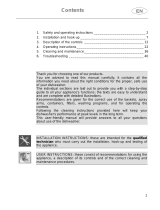
Installation
5
Briefly test the appliance after installation. Run a
wash cycle with a temperature of between 45 and
70°C with the dishwasher empty and using a
specific dishwasher detergent. (It is not sufficient to
run a soak cycle). If the dishwasher fails to operate
correctly, disconnect it from the electrical power
supply and call the nearest technical service centre.
Never attempt to repair the appliance yourself.
The dishwasher should only be used by adults. Use
by children aged from eight years and persons with
reduced physical, sensor or mental capabilities or
lack of experience and knowledge is only permitted
under the supervision of a person responsible for
their safety.
Do not allow children to play with the appliance.
Keep children away from the dishwasher when the
door is open. Always check that the detergent
distributor is empty after completion of the wash
cycle.
Cleaning and regular maintenance of the appliance
by children is only permitted under the supervision
of a person responsible for their safety.
Some detergents are strongly alkaline. Avoid
contact with the skin and eyes. Detergents can be
extremely dangerous if swallowed. They contain
substances capable of causing permanent damage
to the mouth and throat, and even leading to
suffocation. Observe all the safety instructions on
the packaging of these products.





















